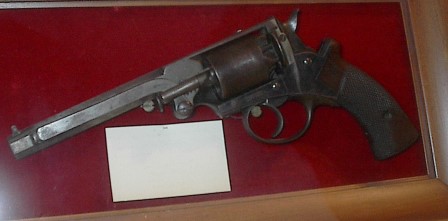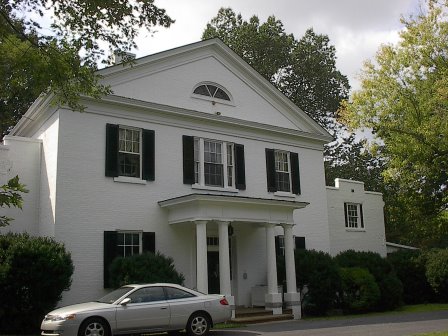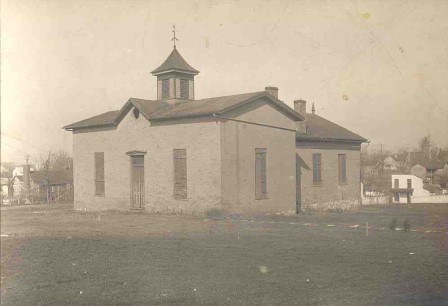William H. Kable was born on September 25, 1837 in Kabletown, Jefferson County, Virginia (now West Virginia). He was the youngest of the children born to John and Ellen Kable. John Kable was a farmer and ran a Grist Mill located on Bullskin Run near the Shenandoah River. Of the three sons of John Kable, William was the only one to receive a formal education. He attended a private school in the area and then taught at it when he was seventeen years old.

After finishing his primary education, William worked on his father’s farm until his father passed away in 1857. He then entered a private school to prepare himself for college, matriculating at the University of Virginia in Charlottesville in the fall of 1858; continuing there until June of 1860. During those years, he studied Latin, Modern Language, Greek, Mathematics, & Moral Philosophy. He left the University and traveled to Southampton County, VA to take a position as the assistant Instructor at the Green Plain Academy.
In April 1861, William Kable answered the call of his home state and traveled back to Charlottesville to enlist in the Virginia Militia. He enlisted as a 4th Sergeant in Company F, 10th Virginia Cavalry Regiment. Kable rose quickly in rank and was promoted to Captain on November 18, 1862. Additionally, he was assigned as the Regiment Quartermaster in April 1863. On June 30, 1863 he was wounded-in-action when he had his horse shot out from under him at Hanover, PA on the first day of the Battle of Gettysburg. After recovering from his wounds, he continued serving in the 10th VA until he was surrendered at Appomattox on April 9, 1865. On his mustering out papers, General Robert E. Lee wrote “This was a good Officer”. (Note: from here on William H. Kable will be referred to as Capt. Kable as was the custom for articles and writings about him during his lifetime and after his death. One interesting note by the researcher is nowhere could it be found, other than the military records of the CSA, that William H. Kable ever referred to himself as “Captain.”)

Capt. Kable returned to his home after the war until the fall of 1866. In September of 1866, he began teaching at a Classical School in Fancy Hill, Virginia. Fancy Hill was a small farming community located about 9 miles south of Lexington, Virginia. An advertisement for the school in the August 21st, 1866 addition of the Staunton Spectator described Captain Kable as “a Christian gentleman, highly recommended for scholarly attainments and success in teaching – He has graduated from most of the schools of the University of Virginia – has been engaged for five years in teaching and designs to make it his permanent profession.”
After the school session ended in 1867, Kable reentered the University of Virginia and was awarded a Master of Arts in May 1868. In September of that year, he established his first school. The Staunton (VA) Spectator reported on June 2, 1868 that “William H. Kable and S.J. Coffman will open a classical and mathematical school in West View, Augusta County; they will teach ancient and modern languages, mathematics, and English.” West View was and still is a small community approximately 5 miles west of Staunton, VA.

Capt. Kable left teaching in June 1869 due to “Defective Eyesight” and returned to his home in Kabletown, WV to take up farming on the family farm for the next three years. It was during this time that he married Willie L. Gibbs. Their first son, William G. Kable, was born September 10, 1872. Also in September of 1872, the Board of Trustees of the Charlestown Academy announced that they had secured the services of Captain W. H. Kable for the 1872-73 school term. The Charlestown Academy was a private school that had been founded in 1795. Capt. Kable would remain the Principal of the Charlestown Academy until May of 1884. During those next 12 years, Capt. Kable continued to develop his credentials and prepare for his next step in his developing his own school. In May of 1873, Capt. Kable was awarded an Honorary Master of Arts from Columbia College (now George Washington University). The details of the reasons for the award are unknown, but events later in the year give clues as to the reasons. In September of 1873, Capt. Kable published an announcement for an “English, Classical, & Mathematical School” at the Charlestown Academy. The article detailed out the design of the school criteria including Courses of Instruction, Method of Instruction, Discipline, Boarding Opportunities, and Terms.

Besides his teaching, Capt. Kable was also active in the Jefferson County government. He was on the Board of Supervisors for Jefferson County and was the President of the County Court for 4 years. Also during this time, Capt. Kable began selling his shares of the family farm. Though the amount received for the land is unknown, the Jefferson county records show that he sold 13 parcels of land. He undoubtedly did this to acquire funds to start his own school.
In 1883, Capt. Kable attempted to purchase Charles Washington’s ancestral home, Mordington (a.k.a. Happy Retreat) when it came up for sale at public auction. Charles Washington was the brother of George Washington and the founder of Charlestown. Capt. Kable was the highest bidder during the auction. However, after the auction, Bassett Mitchell of South Carolina offered a greater price for the property and the court ordered it sold to him. Not able to locate a similarly suitable location to start his own school, Capt. Kable turned his eyes to Staunton, VA.

Capt. Kable was very familiar with the Staunton area. Besides the time he spent teaching in his school at West View, he had several other attachments to the area. His wife had been born and raised until the age of 8 in Augusta County, the county that surrounds Staunton. His Brother-in-Law, William W. Gibbs, was a wagon maker in Staunton in the early 1880’s. Also, being an educator, Capt. Kable would have seen Staunton from an educator’s eyes. In the early 1880’s, Staunton and the surrounding area might have been called the cornerstone of Education for the Shenandoah Valley. Among the schools operating there were the Fishburne School (now the Fishburne Military School), Principled by the founder, James. A. Fishburne; Augusta Military Academy (closed January, 1984), Principled by the founder, Charles S. Roller; the Augusta Female Seminary (now Mary Baldwin University), Principled by Mary Julia Baldwin; the Institution for Deaf and Dumb and the Blind (Now the Virginia School for the Deaf and Blind), Principled by Captain Doyle; and the Virginia Female Institute (now Stuart Hall), Principled by Mrs. Flora Stuart, the widow of Gen. J.E.B. Stuart. Capt. Kable purchased the Alby property just north of the Staunton City limits on May 17, 1884 for his school. The property was described as having a spacious residence and four acres of ground. Capt. Kable also immediately began construction of a classroom for his school.
Capt. Kable had the Prospectus for his new school (which is duplicated below) published at that time in one of the local newspapers. It set the standards and truly the groundwork for the school that would grow into the Staunton Military Academy.
PROSPECTUS
The undersigned, now Principal of the Charlestown Academy, Jefferson county, W. Va., being under the necessity of making such changes in his present residence as will involve considerable expense to meet the increasing demands of his school, has had suggested to him and proposes to remove his school to STAUNTON, if a sufficient local patronage can be assured to him. While greatly encouraged in his present location, he realizes the increased advantages of Staunton as an educational centre, and the better opportunities for the successful prosecution of his efforts, with the added incentive of the lack of a well equipped male school in the city. Educated at the University of Virginia, he claims fitness for his work in a thorough preparation and in the diligent and successful prosecution of the profession thro’ a period of twenty years. He proposes to establish a first-class preparatory school for boys, thorough in all its departments, not only to fit boys for our Universities, but to meet the growing and imperative demand for the accurate and careful training of many who must and do limit their education to the preparatory school.
In addition to the usual curriculum of Ancient and Modern Languages and Mathematics, careful attention has been given to instruction in the Sciences. For illustration in Physics, the school has a large and well selected collection of apparatus and in addition to the usual appliances for instruction in general Chemistry, all the apparatus, such as analytical balances, reagents, &c., for complete laboratory work. The success which has attended the use of the Natural Sciences as disciplinary studies, so generally ignored in schools, has convinced him of their value in the school curriculum, and finds its endorsement in the strongly expressed opinions of some of the best thinkers and writers upon the subject of education in this country and in Europe. In addition to the above appliances, the school is furnished with a large and carefully labeled collection of minerals, selected by one of the best mineralogists in Philadelphia, with special reference to school work.
In the discipline of the school he proposes to follow that course which his past experience has demonstrated to be the only one that can result in permanent good to the pupils and unquestioning obedience of the pupil to the suppression of any habits which may tend to lower the moral tone, or unfit the pupil to the attainment of the best success of which he is capable in the prosecution of his studies: an unremitting effort to establish the kindest and most intimate relations between pupil and teacher.
The responsibilities of the teacher toward his pupil whilst under his charge are conceived to be, as nearly as possible, those of parent and child, and these he dare not violate for the sake of a short-lived popularity, to connive at vices, or overlook idleness or neglect of duty. Only upon these principles has he ever conducted a school, nor has he ever invited patronage from those who do not endorse them.
W.H. KABLE, A.M.
Back in Charlestown, the Board of Trustees for the Charlestown Academy reported to the populous that Capt. Kable had resigned to start his own school in Staunton. They also announced the appointment of a new Principal for the next term. The Charlestown Academy closed its doors in 1906 and the building was torn down in 1912.

Previous Page – – – – Next Page
